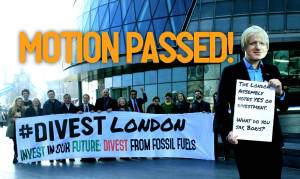GUEST BLOG: Gabriel Davalos, Divest London
Some victories are sudden and unexpected. Some take time, planning and weeks upon weeks of hard work. This victory moves into that latter category.
For months, the campaigners of Divest London have waged a less-than-silent war of persuasion, argument and charm on the members of the London Assembly. With the Green party as an ally, we fought to expand our influence on Labour and the Liberal Democrats. We prepared, we practiced and we convinced. We tweeted, we emailed, we called, we wooed. And it worked!

Today the London Assembly has voted – with an overwhelming majority – in support of fossil fuel divestment. Specifically, it has called on the Mayor of London to support divestment and on the £4.8bn London Pension Fund Authority to divest over the next 5 years. This is no small feat. The motion – drawn up by Divest London and filed by Green Party Assembly Member Jenny Jones – will help to push fossil fuel divestment high up on the agenda for the 2016 mayoral race in the UK capital and square in front of Boris Johnson for the rest of his term. (You can read more about the motion here).
This is a key moment for our campaign to get City Hall to go fossil free. The London Assembly is our voice in city government. The 25 elected members examine issues on behalf of Londoners and hold the Mayor to account. Although Boris gets the final say, this positive vote at the Assembly is a key milestone for the campaign and gives us a strong mandate to put pressure all the way to the top.
Boris does not directly set the agenda for the LFPA, but he does appoint its chair and half of its board. This influence is significant given the political and financial scale of the Fund. We estimate that the Fund currently invests upwards of £100 million in fossil fuel companies, including Shell and two coal companies – Rio Tinto and BHP Billiton – despite the fact that Goldman Sachs has warned thermal coal is reaching its ‘retirement age’, downgrading its long-term valuation by 18%. Meanwhile Ed Davey has singled out coal as ‘the short-term biggest worry by a long way’.
Boris Johnson is already behind on his climate adaptation and mitigation targets, receiving a 4.6 out of 10 scorecard from the London Assembly. Perhaps most outrageously he had been accused by the head of the Met Office’s Climate Monitoring and Attribution Unit of ‘misleading the public’ over spurious claims that global warming is due to solar activity. If the Mayor refuses to divest, he will be forced to justify why City Hall is investing in companies that bank on the Conservative government, at both the city and national level, not enacting their emissions policies and not meaningfully tackling climate change. This is what the major fossil fuel companies hope will happen. Shell and Exxon Mobil have written letters to shareholders saying they think it ‘highly unlikely’ government will limit emissions in the way they have promised. We’re going to prove them wrong – starting today.
If Boris Johnson refuses to divest, he will be actively ignoring the wishes of the London Assembly, Londoners of all stripes – health workers, teachers, students, clergy members, lawyers and parents. He will also be willfully ignoring the warnings of the Bank of England, the Church of England, the World Bank and the UN.
Divestment campaigners claim that those invested in fossil fuels face serious risk from the prospect of “stranded assets”, which mean that the majority of reserves could ultimately be unburnable as governments worldwide consider committing to limit global warming to 2C, with global climate talks in Paris scheduled for December 2015. Indeed, Carbon Tracker research has found that the London Stock Exchange is exposed to particularly high carbon risk, with a third of the FTSE 100 represented by resource and mining companies. And this exposure is increasing year on year; between 2011-2013, exposure to carbon (particularly coal) rose by seven per cent. A recent London Assembly report cited the warning that, consequently, ‘London’s role as a global financial centre is at stake’. Over 250,000 individuals have their pension benefits invested in the LPFA. Most of them are unlikely to be aware that their money is invested in what Ed Davey has called ‘the sub prime assets of the future’.
This is only the beginning. Divest campaigns are springing up in city and borough councils all over the UK. If any of you have read the Guardian’s recent environmental and divestment coverage (which is excellent by the way) you can see that the divestment movement is going mainstream. Indeed, it is no accident that this vote follows the massively successful Global Divestment Day – with its army of Boris Johnson lookalikes and 500 citizens rallying outside of City Hall – or the Time to Act! National Climate March last week with 20,000 people marching through London. It is no accident that the vote comes less than two weeks after Oslo became the first world capital to support fossil fuel divestment, or after Oxford and Bristol City Councils have both divested. Divestment is an idea whose time has come. More than 39 other cities in five countries worldwide have committed to divest from fossil fuels: https://gofossilfree.org/commitments/. London can be on that list. London will lead on that list.
So what do you say, Boris? You are in a position to do some real good for the city and to set an example for the UK and for, really, the world. You can be a leader in this fight or you can fall in line behind fracking CEOs and oil money.
The London Assembly and the people of London have sent a clear message. Are you listening?